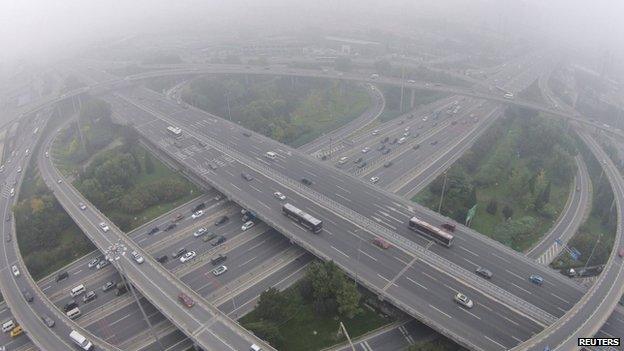China media: Pollution and Apec summit
- Published

Papers say smog has been a big problem for Beijing's's residents
Beijing's pollution woes are back in the media spotlight ahead of the Asia-Pacific Economic Co-operation (Apec) summit.
China has been scrambling to clean up the air by taking several measures, including controlling the number of cars on the roads and suspending factory productions, before dignitaries from more than 20 countries arrive in the capital.
However, "the weather is not helping", quips China Securities Times, external. The report notes that weather forecasters say that Beijing will be covered in smog during the first few days of the week-long Apec meeting.
Beijing authorities have dispatched 16 teams of inspectors to ensure the factories comply with temporary restrictions, the Beijing News, external reports.
The Beijing Times, external, however, reports that some errant factories have been defying the orders.
The paper reports that the inspectors paid "secret visits" to these factories and found that some of them were running production "with full force" during late nights.
Commenting that the restrictions have resulted in "temporary air quality improvement", the China Daily , externalcalls for "sustainable development programmes" to ensure clean air in the long term.
"Beijing residents will no doubt feel uneasy when the city is once again smothered in smog after the Apec meeting, but they will get used to it as they did before," says the daily.
"However, the authorities should not get used to the quick-fix model of using special measures to improve the air quality just for special occasions," it adds.
Echoing similar sentiments, a citizen journalist's article in the Xinhua News Agency, external hopes that the international event will provide an opportunity for the authorities to rethink on ways to solve Beijing's pollution problem.
"The Apec is only here for a few days, yet for this meeting, we have mobilised the masses and paid a high price for the blue sky. When the event comes to a close, can we still keep the sky clean?" it asks.
New trade deal
Meanwhile, papers dismiss speculations that China's plan to promote a new regional trade pact during the Apec summit is targeted at the US.
Noting that there are currently more than 50 different free trade agreements in the Asia-Pacific region, China Radio International, external reports that Beijing will push for a Free Trade Area for the Asia-Pacific (FTAAP) agreement during the meeting.
Observers feel that Beijing has been pushing for a new free trade agreement to rival the US-led Trans-Pacific Partnership that involves 12 regional countries, but excludes China.
State-run China News Service, external, however, assures that China's attempt to revive the idea, which has been around for about 10 years, is not to "set up a new shop".
"It is not true that China is trying to compete with the TPP by pushing for the regional integration," says Wang Yizhou, an expert on international relations at Beijing University.
"This is not simply about repulsion. There will be many overlapping agreements in the current world economy, and each one is complementary to the other," he adds.
And finally, several media outlets have been urging Japan to show "sincerity" to ensure a meeting between PM Shinzo Abe and President Xi Jinping on the sidelines of the Apec meeting.
Tensions between the two countries have escalated in the past few months over territorial disputes.
An article in the China Daily, external says Beijing will "welcome an open dialogue" only if the "Japanese guests" are "sincere in dealing with the historical as well as current issues".
BBC Monitoring, external reports and analyses news from TV, radio, web and print media around the world. For more reports from BBC Monitoring, click here. You can follow BBC Monitoring on Twitter, external and Facebook, external.